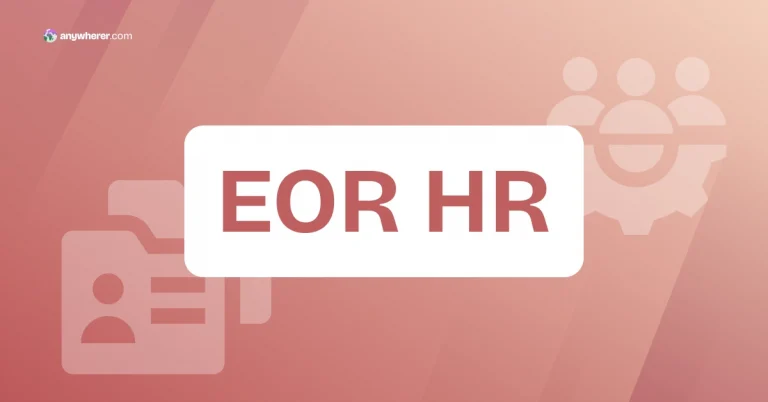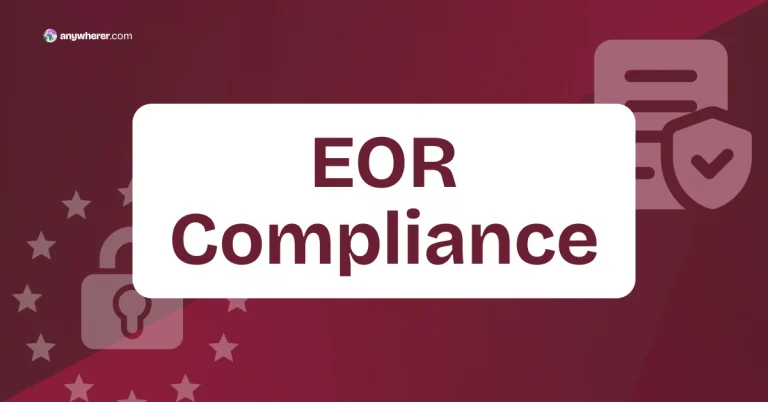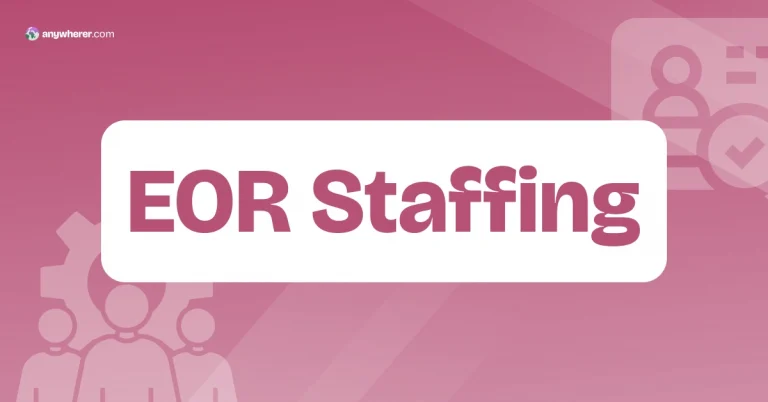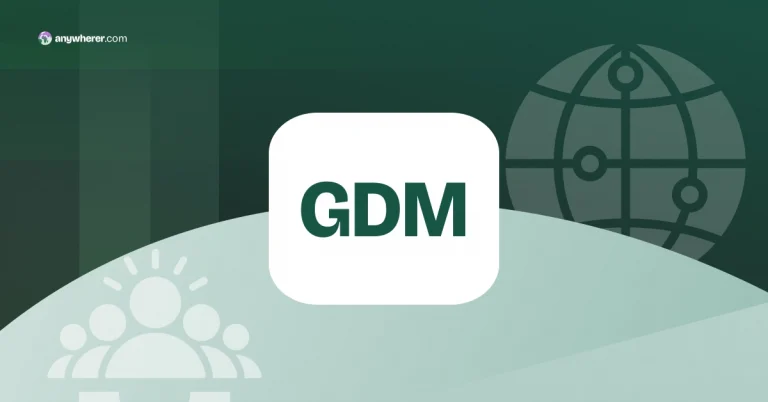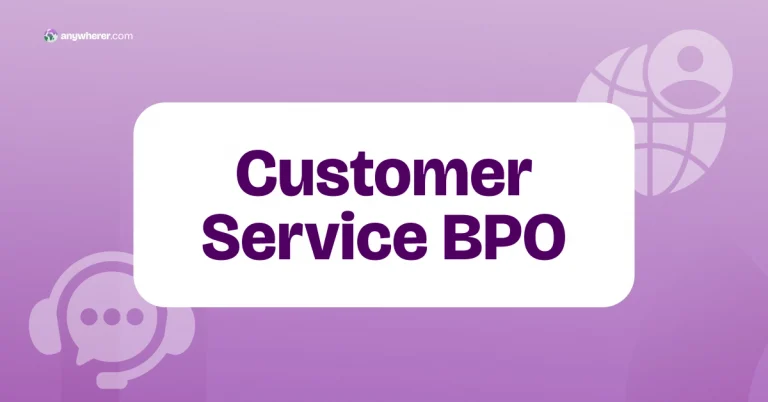An Employer of Record is a third-party company that legally employs individuals on behalf of a client business. One of the fundamental services an EOR provides, as part of its core offerings, is payroll management. In this article, we will interpret how does EOR work, and why it is imperative for businesses with global operations.
EOR Payroll Explained
EOR payroll is the complete payroll administration service performed by an Employer of Record. Unlike a standard payroll outsourcing provider, an EOR acts as the Employer of Record international payroll provider, handling wage payments, tax withholdings, and benefits compliance directly on behalf of the client.
The EOR takes care of salary payment in local currency, correct withholdings of taxes, social security payment, and all compliance reporting. Legal liability of this EOR payroll solution differentiates it from traditional outsourced payroll services where the client remains the de facto employer.
Employer of Record payrolling is favored by businesses when hiring employees in foreign countries where they lack a local entity. It is a cost-effective, compliant way of compensating global workforces. It does not increase internal overhead and legal exposure.
Main Employer of Record Payrolling Functions
EOR payroll administration includes a very wide range of core services, each of which is established in conformity with national legal and fiscal obligations. A typical EOR payroll service handles the following responsibilities:
- Salary calculation and payment: As part of the cost of EOR, the provider calculates gross-to-net salary and compensates employees in local currency, on time and according to national wage regulations.
- Withholding tax and social contribution: EOR withholds and remits payroll taxes to host-tax authorities directly. These include income tax, social security, health, and other mandatory withholdings, providing comprehensive Employer of Record payroll tax support for businesses operating across borders.
- Year-end tax reporting: EOR prepares and submits applicable end-of-year payroll reports and tax returns on behalf of the authorities and employees.
- Tax and labor regulation compliance: EOR payroll ensures all payroll activities’ compliance with local labor laws, including minimum wage, working hours, and paid time off.
- Additional compensation: The EOR handles bonus, reimbursement, severance pay, and other monetary components as and when required.
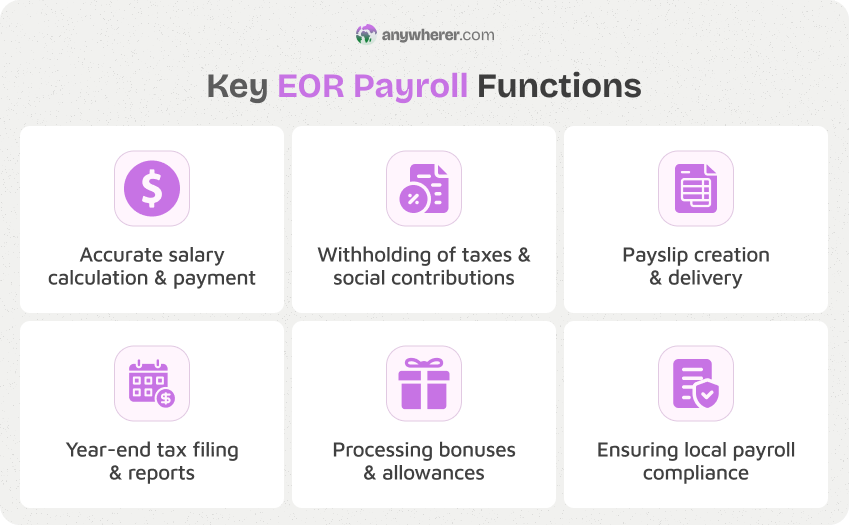
Employer of Record payroll services allow businesses to avoid direct engagement with complex problems like tax compliance or employee misclassification without forgoing transparency and control.
Benefits of Global Employer of Record Payroll to Globalizing Businesses
Using an EOR payroll service offers clear strategic and operational advantages for businesses expanding globally. The main benefits are as follows:
- Speed to market: Employers do not need to establish a local entity, thus they can start recruiting employees and paying them within a few weeks. This allows faster market entry.
- Compliance assurance: Employer of Record tax withholding support offers compliant local payroll with complex labor, tax, and social security laws, reducing the risk of fines or litigation.
- Accuracy and consistency: Payroll is run using standard processes in every country, removing the possibility of human error and enabling on-time and assured payment of wages.
- Risk mitigation: Employer of Record payrolling avoids misclassification or non-compliance with tax laws by making the EOR legally accountable for managing payroll.
- Improved employee experience: Employees receive accurate pay, with local benefits and correct documentation – trust and retention levels rise to improve.
In so doing, businesses gain operational flexibility of global hiring with a most reliable EOR payroll platform that resolves administrative and legal problems. These benefits are why many companies choose to partner with leading EOR providers for global payroll when scaling their operations internationally.
EOR Payroll vs Payroll Outsourcing
Though both models entail handling payroll, the distinction lies in legal responsibility. In payroll outsourcing, the provider helps your existing legal entity carry out payroll calculations and administrative tasks. Your business remains the legal employer and bears all compliance risk.
With EOR payroll, the Employer of Record is actually the employer. This includes employment contract responsibility, payroll tax assistance, and compliance in every jurisdiction.
In short:
- Use payroll outsourcing if you have a local entity but need help with payroll.
- Use an EOR if you don’t have a local entity but need a compliant hiring and payroll solution.
This makes the EOR model the preferred choice for companies expanding to new markets where there are no legal structures. When selecting a provider, it’s important to look for the best employer of record service for international payroll to ensure compliance, efficiency, and employee satisfaction across all jurisdictions.
FAQs About Payroll EOR
Can an EOR manage payroll in various countries simultaneously?
Yes, a global employer of record payroll solution can process payroll across nations simultaneously. With one EOR payroll solution, businesses can hire skills worldwide without having to create local legal presence. It consolidates payroll management, is compliant with local tax regulations and labor legislation in every country, and helps address payroll uniformity across the globe. It’s a central element of employer of record global payroll solutions.
How secure is payroll data handled by an EOR?
Security of data is given high priority by EOR payroll management with enterprise-grade security practices. Leading EOR solutions for global payroll typically use encryption, data anonymization, secure cloud infrastructure, and access control procedures. They also support international data privacy regulations such as GDPR or CCPA, keeping sensitive payroll data like salary records, tax identification numbers, and bank account information in the strictest confidence.
Does EOR payroll affect employee classification or benefits eligibility?
No. Best EOR providers do not misclassify workers as employees when they are not. Misclassification risks are dramatically reduced because the EOR has legal responsibility for compliance with labor laws. Furthermore, workers are fully entitled to statutory benefits like healthcare, paid time off, or retirement contributions. Some EOR payroll services offer access to voluntary benefits as well, further enhancing retention and morale of remote teams.
How quickly can payroll be rolled out when utilizing an EOR?
EOR payroll configuration is possible in 5 to 10 business days, depending on the size of the workforce and the location. Since the EOR has legal infrastructure in place, it’s not necessary to wait for entity setup and licensing. This rapid onboarding makes payroll EOR services especially beneficial for companies that need to move into new markets quickly while still having full compliance with employer of record tax implications support and local labor laws. Ultimately, top EOR companies for payroll empower businesses to operate globally without the usual administrative burdens or legal risks.

Yaryna is our lead writer with over 8 years of experience in crafting clear, compelling, and insightful content. Specializing in global employment and EOR solutions, she simplifies complex concepts to help businesses expand their remote teams with confidence. With a strong background working alongside diverse product and software teams, Yaryna brings a tech-savvy perspective to her writing, delivering both in-depth analysis and valuable insights.

